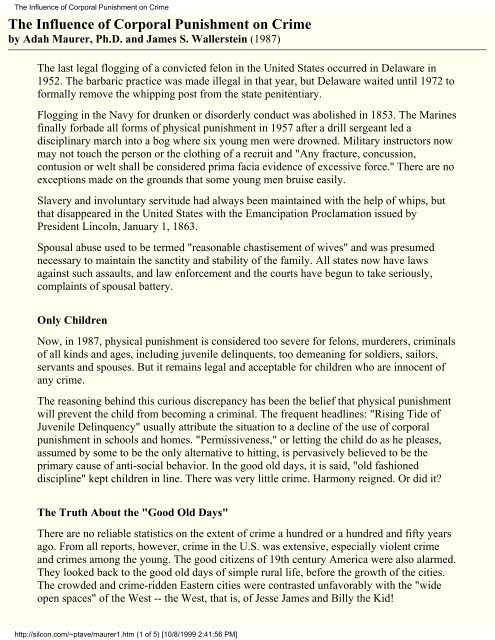spanking - Unauthorized web page
spanking - Unauthorized web page
spanking - Unauthorized web page
You also want an ePaper? Increase the reach of your titles
YUMPU automatically turns print PDFs into web optimized ePapers that Google loves.
The Influence of Corporal Punishment on Crime<br />
The Influence of Corporal Punishment on Crime<br />
by Adah Maurer, Ph.D. and James S. Wallerstein (1987)<br />
The last legal flogging of a convicted felon in the United States occurred in Delaware in<br />
1952. The barbaric practice was made illegal in that year, but Delaware waited until 1972 to<br />
formally remove the whipping post from the state penitentiary.<br />
Flogging in the Navy for drunken or disorderly conduct was abolished in 1853. The Marines<br />
finally forbade all forms of physical punishment in 1957 after a drill sergeant led a<br />
disciplinary march into a bog where six young men were drowned. Military instructors now<br />
may not touch the person or the clothing of a recruit and "Any fracture, concussion,<br />
contusion or welt shall be considered prima facia evidence of excessive force.'' There are no<br />
exceptions made on the grounds that some young men bruise easily.<br />
Slavery and involuntary servitude had always been maintained with the help of whips, but<br />
that disappeared in the United States with the Emancipation Proclamation issued by<br />
President Lincoln, January 1, 1863.<br />
Spousal abuse used to be termed "reasonable chastisement of wives" and was presumed<br />
necessary to maintain the sanctity and stability of the family. All states now have laws<br />
against such assaults, and law enforcement and the courts have begun to take seriously,<br />
complaints of spousal battery.<br />
Only Children<br />
Now, in 1987, physical punishment is considered too severe for felons, murderers, criminals<br />
of all kinds and ages, including juvenile delinquents, too demeaning for soldiers, sailors,<br />
servants and spouses. But it remains legal and acceptable for children who are innocent of<br />
any crime.<br />
The reasoning behind this curious discrepancy has been the belief that physical punishment<br />
will prevent the child from becoming a criminal. The frequent headlines: "Rising Tide of<br />
Juvenile Delinquency" usually attribute the situation to a decline of the use of corporal<br />
punishment in schools and homes. "Permissiveness," or letting the child do as he pleases,<br />
assumed by some to be the only alternative to hitting, is pervasively believed to be the<br />
primary cause of anti-social behavior. In the good old days, it is said, "old fashioned<br />
discipline" kept children in line. There was very little crime. Harmony reigned. Or did it?<br />
The Truth About the "Good Old Days"<br />
There are no reliable statistics on the extent of crime a hundred or a hundred and fifty years<br />
ago. From all reports, however, crime in the U.S. was extensive, especially violent crime<br />
and crimes among the young. The good citizens of 19th century America were also alarmed.<br />
They looked back to the good old days of simple rural life, before the growth of the cities.<br />
The crowded and crime-ridden Eastern cities were contrasted unfavorably with the "wide<br />
open spaces" of the West -- the West, that is, of Jesse James and Billy the Kid!<br />
http://silcon.com/~ptave/maurer1.htm (1 of 5) [10/8/1999 2:41:56 PM]






